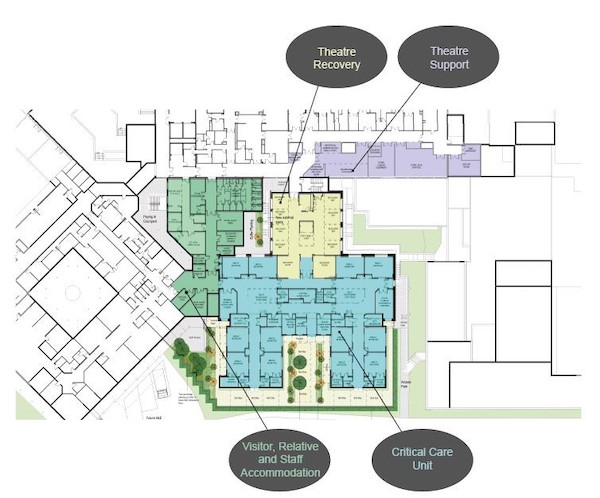


The Princess Elizabeth Hospital has been running at capacity for a fortnight and critical issues with bed stock have seen dozens of surgeries, including one cancer surgery, postponed.
The ongoing situation has led to calls of clarity from current and former politicians on social media, with former Deputy Barry Brehaut seeking more detail.
This type of media release simply details what might be described as the new norm, the new business as usual. There was a time when politicians would have been called to give a full account and discuss in detail, on the record, the circumstances giving rise to such a situation. https://t.co/csUmO4NgLb
— Barry Brehaut. ????????????????????????????????????????????↙️ (@BrehautBarry) March 6, 2024
While heightened pressure on the hospital is nothing new, it reached a critical point earlier this week when Health announced that 19 elective surgeries had been postponed.
A spokesperson said: "There is no single factor impacting on acute care and it is a seasonal issue with demand outstripping available capacity. Teams have worked tirelessly to minimise the numbers of postponed elective surgery."
A subsequent update from HSC revealed that a cancer surgery had also been postponed:
“We will continue to prioritise emergency surgeries and elective cancer surgeries, however this morning we did reluctantly have to postpone one cancer surgery due to a lack of a critical care bed for them. This occurred after the media release was published.”
Questions have since been asked whether this situation has been compounded by ‘delayed transfer of care’.
This issue was raised in last year’s key performance indicators report, which shed light on how well the MSG and HSC were servicing the community.
One area which was specifically pulled out as challenge for healthcare in Guernsey is the measure of the number of days a patient stays in hospital after they are considered fit for discharge.
“This is either because a nursing or care home bed is not available or because they need extra care at home,” HSC said at the time.
“The 2022 result is 629 days per month, up from 387 days in 2021 and against a target of fewer than 100 days a month. This equates to some 20 beds in PEH constantly filled with patients who could have been discharged which results in postponement of surgery and worsens waiting times.”
It’s a consideration Deputy Gavin St Pier highlighted in response to the ongoing situation:
Who will tell us: how many beds are blocked by ‘Delayed Transfer of Care’ - identified as problem in recent report on secondary care? And what, if anything, is being done right now to ease that problem? Or do we: a) just hope eases; b) cancel more elective surgery? https://t.co/vlGZbIJ01E
— Gavin St Pier ???????? (@gavinstpier) March 6, 2024
It’s understood that there are currently 14 beds occupied by people who should be accommodated elsewhere.
A ward which had been ring fenced for orthopaedic surgeries is now being utilised to address more urgent procedures as HSC seeks to alleviate pressure on the hospital.
De Havilland Ward was opened up for orthopaedic surgeries in 2022 to put a dent in an 800 strong waiting list.
As of October last year 463 surgeries had taken place in the unit, however the waiting list had expanded to nearly 900 in the same period of time.
“The de Havilland unit has provided us with much needed ring-fenced beds for elective surgery within a specialist and dedicated unit,” said Consultant Orthopaedic Surgeon, George Cooper, at the time.
“This also means that these beds cannot be used for other procedures in the hospital which means elective orthopaedic procedures can be prioritised.”
Preparations for a “challenging winter” were announced late last year, as Health revealed that a lack of critical care beds could impact elective procedures. An assurance was made that the hospital “would never discharge someone if it wasn’t safe to do so”.
Bed stock pressures are set to be alleviated somewhat with the completion of the first phase of the Hospital Modernisation Programme, which includes a new Critical Care Unit and an adjacent Theatre Recovery Unit which combined will provide an additional 22 beds.

A spokesperson said that continual updates will not be provided due to a fast moving situation.
However, Express has reached out to HSC with several questions and a request for an interview, in the hopes of understanding more about the extent of the disruption and what is being done to alleviate it.
It’s worth noting that the UK has introduced a new system to record and analyse operational pressures.
OPEL (Operational Pressures Escalation Levels) is used to grade the severity of capacity issues and has replaced the historic use of ‘black alerts’ which indicated moments of increased pressure.
Jersey has historically used a red, amber, green system to grade the level of pressure experienced by the hospital, mainly in regards to bed stock.
Express has asked if the Princess Elizabeth Hospital has an equivalent system.
Comments
Comments on this story express the views of the commentator only, not Bailiwick Publishing. We are unable to guarantee the accuracy of any of those comments.